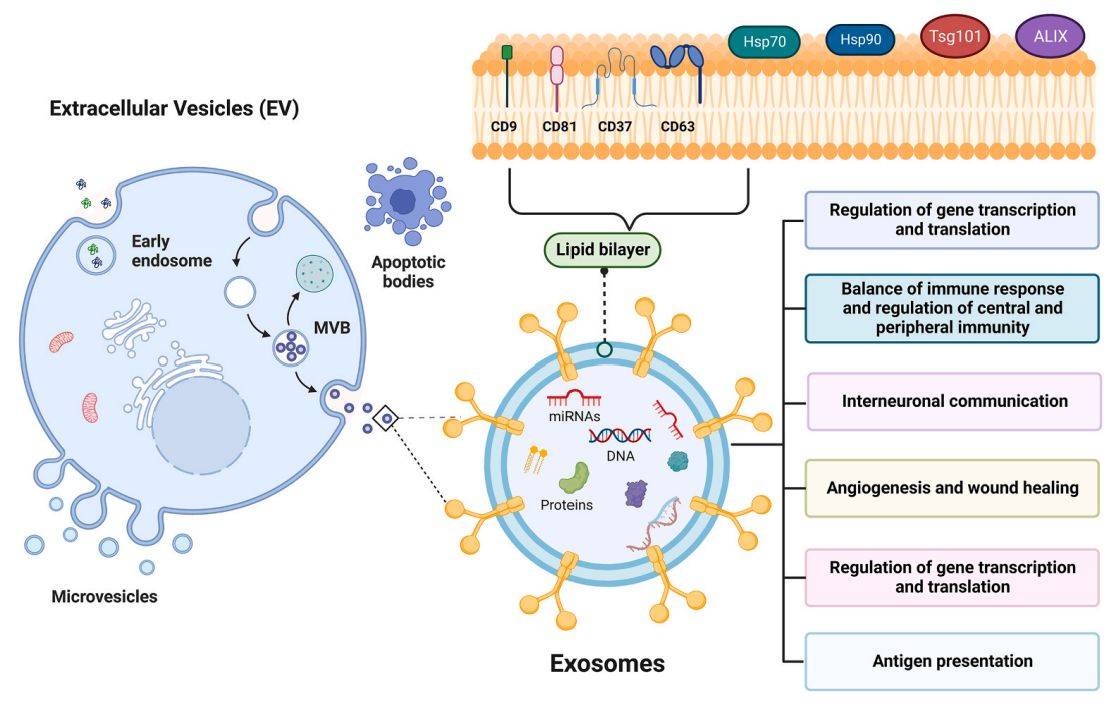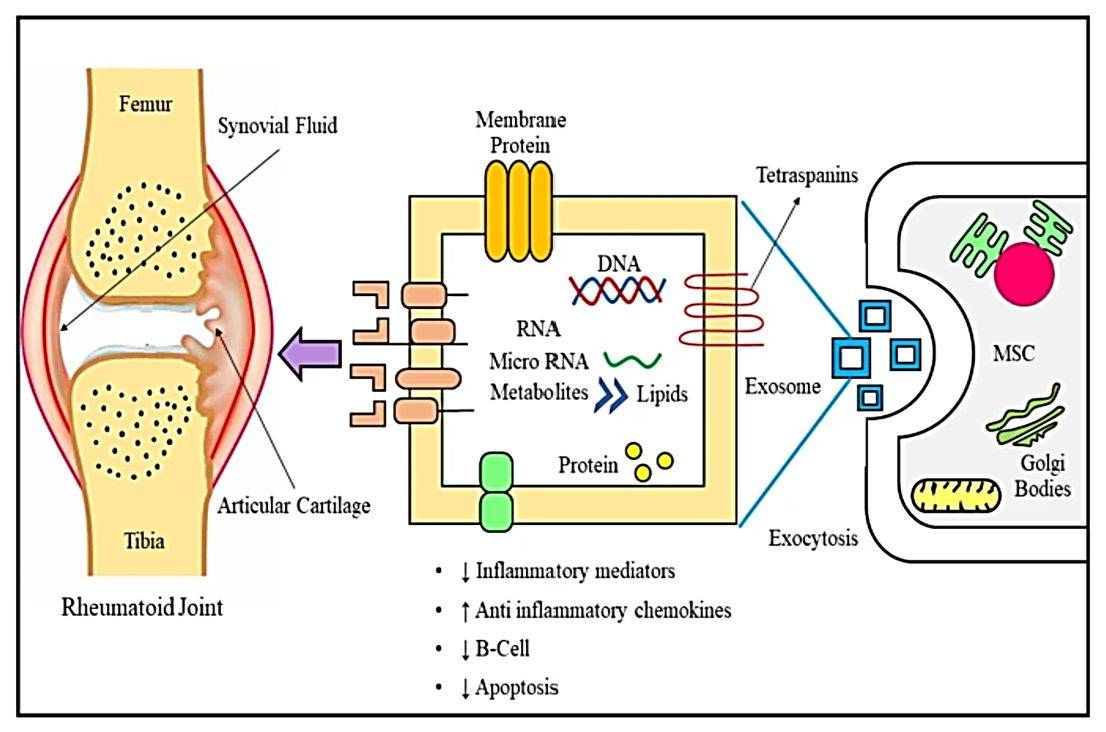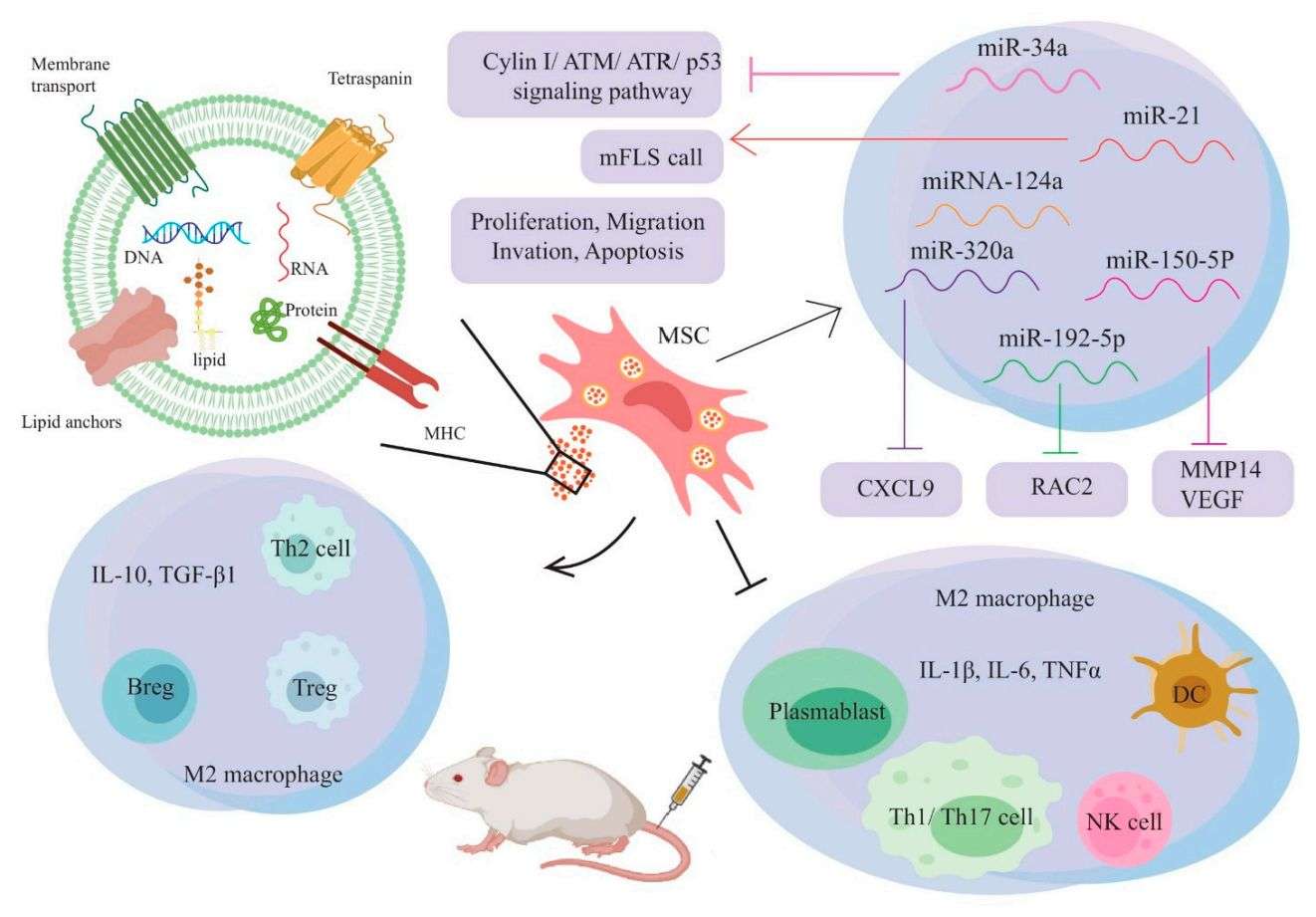Exosome Research in Human Rheumatoid Arthritis
Rheumatoid arthritis (RA) is an autoimmune disease in which the patient's immune system incorrectly recognizes and attacks the tissues surrounding the joints, resulting in joint inflammation, pain, swelling, and stiffness. The pathogenesis of RA is complex and has a poor prognosis, and there is no complete cure for the disease.
Exosomes are a subpopulation of extracellular vesicles that carry substances that regulate the physiological state of target cells in various ways. In recent years, several studies have suggested that exosomes may play a key role in the pathogenesis of RA. The study of exosomes and their related components is potentially valuable for the comprehensive understanding of the pathogenesis of RA and the experimental treatment of RA.
 Figure 1. Biogenesis and biological characterization of exosomes. (Liu Y, et al., 2024)
Figure 1. Biogenesis and biological characterization of exosomes. (Liu Y, et al., 2024)
Purification and Characterization of Exosomes
Exosomes are present in a variety of body fluids, including plasma, urine, breast milk, cerebrospinal fluid, and synovial fluid of joints. Isolation and purification of exosomes from these samples are important for subsequent identification of exosomes and detection of their function. Current methods of exosome isolation include differential ultracentrifugation, density gradient centrifugation, precipitation, ultrafiltration, affinity chromatography, microfluidic technology, etc.
The characterization of exosomes requires observation of individual vesicle structures and detection of diameters, and methods include visualization electron microscopy, atomic force microscopy, ultra-high resolution microscopy, nanoparticle tracking and analysis techniques, and high-resolution flow cytometry.
Mechanisms by which Exosomes Influence RA Occurrence and Progression
- Exosome-borne Proteins Mediate RA Progression
A large number of citrullinated proteins present in exosomes of RA patients can act as antigens to trigger an autoimmune response, forming a large number of immune complexes (ICs) deposited in the synovial space, which in turn stimulate the production of inflammatory factors by mast cells, neutrophils, etc., and further worsen the condition of RA. The nuclear DNA-binding proteins released by macrophages through exosomes can also participate in the pathogenesis of RA as autoantigens. Synovial fluid and exosomes secreted by fibroblast-like synoviocytes (FLS) in RA patients have been shown to contain DNA-binding inhibitory factor 1 (Id1). Id1 accelerates neovascularization at inflammatory sites and promotes FLS proliferation.
- Exosome-associated RNA Mediates RA Progression
In peripheral blood samples from RA patients, miR-155 expression is significantly elevated in memory B cells compared to normal subjects. miR-155 enhances the recruitment of foreign immune cells by monocytes and exacerbates local inflammation by inhibiting the expression of monocyte-macrophage CC chemokine receptor 2 (CCR2) in synovial tissues where it is retained. Synovial cell death also releases large amounts of miR-let-7b, which binds to TLR7 on the surface of naïve monocytes and induces them to differentiate into M1-type macrophages, thereby promoting the release of pro-inflammatory factors such as TNF and IL-6, leading to the deterioration of the condition of RA patients.
 Figure 2. Exosome involvement in RA progression. (Singh A, et al., 2023)
Figure 2. Exosome involvement in RA progression. (Singh A, et al., 2023)
Exosomes in the Diagnosis of RA
A significant positive correlation between amyloid A (AA) and lymphatic vessel endothelial hyaluronan receptor 1 (LYVE-1) and CRP has been detected in exosomes extracted from serum samples of RA patients, suggesting that the first two may be involved in RA pathogenesis. Compared with normal subjects, serum exosomes from RA patients contained seven IncRNAs with significantly up-regulated expression levels and six with significantly down-regulated expression levels. In addition to IncRNAs, a variety of miRNAs, including miR-155miR-146 and miR-let-7b, are differentially expressed in RA patients and normal subjects. Based on the abnormal expression of protein and RNA components in RA patients, exosomes can be used as biological markers to indicate the onset of RA, which is of great potential clinical value.
Perspectives of Exosomes in RA Therapy
Utilizing exosomes can re-induce the body's tolerance to self-antigens, which can prevent the development of the disease. Mesenchymal stem cell (MSCs)-derived exosomes have been found to exert immunosuppressive effects by reducing the proliferation of T and B lymphocytes and inducing Treg cell populations in inflammatory arthritis. In vivo experiments in animals revealed that MSCs- Exos attenuated osteoarthritis symptoms in osteoarthritic animals. In RA studies, MSCs-Exos possessed the therapeutic effect of MSCs and reduced the potential therapeutic risk of MSCs. In addition, it has been found that oral administration of bovine milk-derived exosomes can reduce inflammation in collagen-induced arthritis models, which is expected to provide a new strategy for the treatment of RA. Exosomes can not only be used as therapeutic agents but also engineered exosomes can be used as carriers for binding drugs to meet the needs of precision therapy.
 Figure 3. Therapeutic and immunomodulatory role of MSC-EVs in RA. (Heydari R, et al., 2023)
Figure 3. Therapeutic and immunomodulatory role of MSC-EVs in RA. (Heydari R, et al., 2023)
Our Services and Products
As a pioneering biotechnology company, Creative Biostructure is committed to unlocking the therapeutic potential of exosomes in the diagnosis and treatment of human RA. Our team of experts provides high-quality exosome products and customized services that enable researchers to explore the vast possibilities of exosome-based therapies.
From exosome isolation and characterization to functional analysis and biomarker discovery, our integrated solutions enable our clients to delve into the complex mechanisms behind rheumatoid arthritis. By leveraging the regenerative and regulatory properties of exosomes, we are committed to supporting the development of new diagnostic tools and personalized treatment strategies. Feel free to contact us for a formal quote.
| Cat No. | Product Name | Source |
| Exo-HDBF-13 | HQExo™ Exosome-SDH-Rheumatoid Arthritis plasma | Exosome derived from Single Donor Human Rheumatoid Arthritis plasma |
| Exo-SC01 | HQExo™ Exosome-PCS-500-011 | Exosome derived from human pre-adipose derived mesenchymal stem cell (PCS-500-011) |
| Exo-SC03 | HQExo™ Exosome-hTERT | Exosome derived from hTERT-immortalized Mesenchymal Stem Cell |
| Exo-SC04 | HQExo™ Exosome-MSC | Exosome derived from Xeno-Free Human Mesenchymal Stem/Stromal Cells and Media |
| Exo-SC02-1 | HQExo™ Exosome-PCS-500-012 | Exosome derived from human bone marrow-derived mesenchymal stem cell line (PCS-500-012) |
| Exo-SC02-2 | HQExo™ Exosome-Pla-MSC | Exosome derived from human placental derived mesenchymal stem cell |
| Explore All Exosome Products | ||
References
- Liu Y, et al. Exosomes and exosomal miRNAs: A new avenue for the future treatment of rheumatoid arthritis. Heliyon. 2024. 10(6): e28127.
- Singh A, et al. Exploring the role of exosomes in rheumatoid arthritis. Inflammopharmacology. 2023. 31(1): 119-128.
- Heydari R, et al. Exosomes as Rheumatoid Arthritis Diagnostic Biomarkers and Therapeutic Agents. Vaccines (Basel). 2023. 11(3): 687.